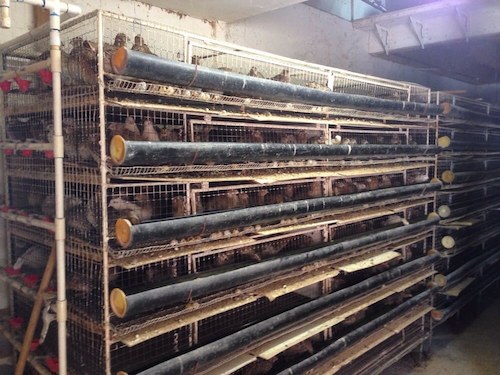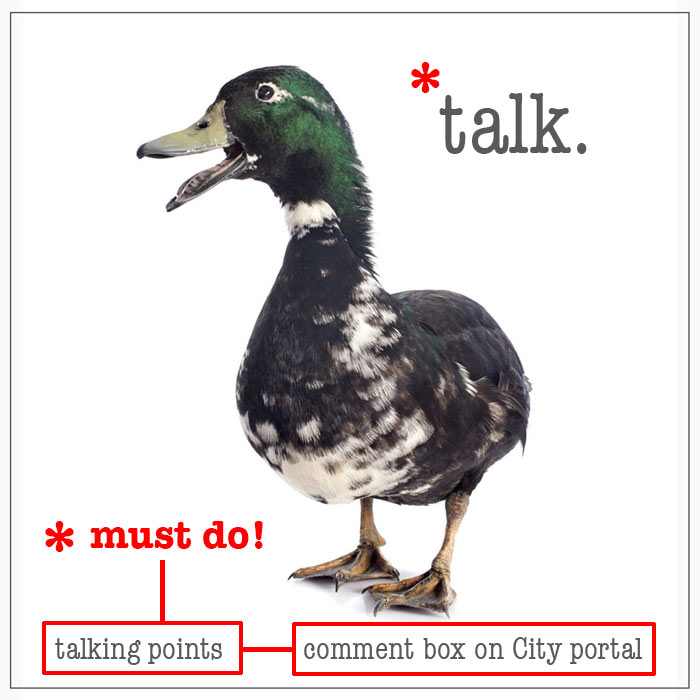Talking Points: LA City Council Live Animal Markets
Please see our Live Market Campaign page, with the LA City Council's motion, sample letters and more.
Ready with your own talking points? —> go to the City portal here.
We prefer to write "live animal markets," not "wet markets," because "wet markets" means "farmers' markets" to people in Asia and other places.
Talking Points
| We are now, more than ever, concerned about health and the transfer of disease through the handling of animals. The world is a global village, and that is why what happens in Los Angeles matters to me. |
| Animals in crowded conditions are likely to transmit disease when stressed. |
| Los Angeles live animal markets confine thousands, if not tens of thousands, of egg-laying quail. These birds do not have the Prop 12 protections Californians voted to pass, because the law does not protect animals in the live markets. They can't lie down, stand up, turn around freely & fully extend their limbs without touching the side of an enclosure, or another animal. |
| Scientists estimate that more than 6 out of every 10 known infectious diseases in people can be spread from animals, and 3 out of every 4 new or emerging infectious diseases in people come from animals. (CDC) |
| 111 viral families have been discovered globally to date. Of these families, researchers have targeted 25 viruses known to infect (or to have substantial risk of infecting) people. In these 25 families, an estimated 1.67 million unknown viruses exist in mammals and birds—hosts that represent 99% of the risk for viral emergence. (Carroll, Daszak, et al) |
| Prevention is key. Salmonella, Pasteurella, giardia and many other zoonotic diseases are a daily threat. Reemergence of H2N2 in humans is a significant threat, having caused 1 million to 4 million deaths from 1957 to 1968. |
| Crowding, transporting, caging and neglecting basic needs are inhumane treatment of animals. |
| Poultry, quail, goats, sheep, rabbits, turtles, bullfrogs, snakes, even alligator parts have been found in the live animal markets. The more species we exploit, the greater risk we take with public health. |
| These animals do not simply appear in the markets. Weeks and months before, they are either stolen from their natural habitats, or raised in crowded, unsanitary conditions. Next, a shipper sends them to a transporter who sells/ships/or transports them to either a warehouse or a middleman, or a business owner gets them at auction in the Central Valley and trucks them to LA. Some arrive Dead. On. Arrival. Imagine, the animals have no control, and are packed in containers and flown, shipped, trucked around for days or weeks with no water or food. All of this amounts to unnatural, terribly cruel and stressful conditions that weaken the animals' immune systems, and because of their close proximity to each other, disease spreads rapidly, and can make the zoonotic leap to the people handling them. |
| Although it's illegal, fully-alive animals may be sold to customers to take home to slaughter or otherwise use and exploit. |
| Frogs and turtles that are sold under the table suffer particular abuse because they often do not have water and suffocate, stacked in containers. |
| By snatching the frogs, turtles, snakes and other wild animals from their natural habitats, we are upsetting nature's balance and threatening biodiversity. |
| The cruelty for turtles is unspeakable. The animals should be first clubbed on the head to render them unconscious, but turtles naturally retreat into their shells. The result is that these turtles have their shells butchered from their bodies while fully alive. |
| Bullfrogs carry the dread chytrid fungus, which is responsible for an unprecedented loss of species, including native California species like our state amphibian, the California red-legged frog. |
| Two million live bullfrogs and 400,000 turtles are trafficked and imported to California annually. There is no disease testing or quarantine of these animals before they are brought to the markets. |
| The live animal markets in Los Angeles are not zoned for animal agriculture or slaughter. |
| Businesses, themselves, should not need to close; but the sale and slaughter-on-demand of live/living animals should be prohibited in this age of emerging zoonotic diseases. It makes sense, in these times of climate crisis, pandemics and extinction, for all businesses to transition to sustainable models, for the health of all living beings and the Earth itself. |
| Viruses like COVID are colorblind and species blind. The way COVID destroyed the Dutch mink was as devastating and swift as the more than a million Southern California poultry birds that were killed by Virulent Newcastle Disease. In the same way, COVID swept through virtually every country on the globe, and runs its course in any host it can find. It is an equal opportunity virus. |
| It would be a tragic irony if Los Angeles, one of the most progressive cities in the world, were to become the epicenter for a future pandemic. We must do everything in our power to make sure that doesn't happen. |
Staging Area
1. Please customize a group of comments from throughout the list, not just those on top (to avoid rote duplication).2. Copy (click button at left) & paste (control-v or ⌘v in staging box) the talking points you would like to use into this box.
4. Copy your group of comments into the city portal
IMPORTANT! —> confirm your submission by opening your email from the City Clerk & clicking the button.
5. Share this campaign —> pawpac.org/LAmarkets with your network!

California voters passed Prop 12 in 2018 to provide space for farmed animals to exist. Unfortunately, live animal markets do not benefit from Prop 12, leaving thousands of egg-laying quail in battery cages for life, like the ones pictured above.
Read our July alert and news in LAist/KPCC
PawPAC is 100% volunteer-powered! Your donation will help immensely, and we greatly need it. Celebrating 40 years next month, August 2020.



